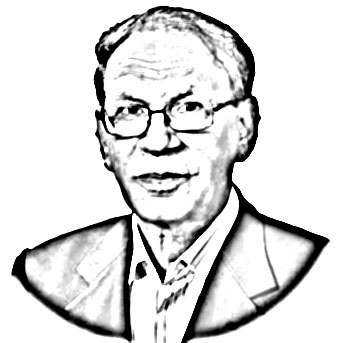Mohammad Jamil
IT is not real democracy but sham democracy in Pakistan. In real democracy, it is government of the people, by the people and for the people whereas it is government of the elite by the elite and for the elite. Since the leadership of major political parties revolve around the founder or his/her family members, Pakistan could not get second and third tiers of leadership. As a matter of fact, ruling classes comprising civil and military bureaucracy, feudal lords, absconders, liars, traitors, aqama holders, money launderers and agents of foreign powers have been ruling in the name of democracy since the inception of Pakistan. According to Hegel, a leader has to be conversant and in harmony with the spirit of the age. A real leader is a master strategist and a great tactician, who blends pragmatism with idealism to achieve the desired objective of a better life for its people.
To understand as to how a leader can use the immutable laws of society and lead the masses to vitality and stability, one must look at the methodology of a botanist with his plants, or an agricultural expert with an orchard. An agricultural scientist observes all factors affecting the growth of trees in an orchard, including the effect of laws of nature, climatic and environmental conditions, culture and type of trees, and then using his knowledge, experience and expertise manoeuvres these laws for the benefit of trees to grow fast and bear the best quality fruit. So does a genuine and conscientious leader with world vision and conscious of social, cultural and economic conditions of the people. He approaches the innermost feelings of the people, mobilises them against the decadent system, and put the society on the road to development.
It is an irrefutable fact that the destiny of a nation depends on the determination of its people; but there has to be a leader with vision, courage and wisdom to inspire them to unite in their struggle for safeguarding the sovereignty and independence of their country, and to put it on the path of progress and prosperity. In Pakistan, myriad political and religious parties, intellectuals, pseudo-intellectuals, or government and the opposition parties have variegated stances and perceptions about various issues and challenges facing the country. But there appears to be a consensus that Pakistan is facing a multifaceted crisis, which is the result of the ruling elite members’ lust for power and flawed decisions over half a century. However, it has to be mentioned that none of the first seven prime ministers, military dictator Ayub Khan and Prime Minister Zulfiqar Ali Bhutto were ever accused of corruption and plundering of national resources.
It would be absurd to say that all rulers of the past were dishonest or they did nothing worthwhile. Some of them had taken good decisions, and of course, including some controversial decisions as well. Ayub Khan’s contribution to industrialise the country was appreciable; he gave incentives and free hand to the entrepreneurs, but the downside was that his government did not take measures to ensure welfare of the working classes. It was also due to the lopsided policies of various governments that only a few regions were developed to the neglect of others, and contradictions became irreconcilable that led to the breakup of the motherland. During the “lost decade” of 1990s, the PPP and the PML-N twice formed governments, but both parties had been accusing each other’s leaders of corruption.
The fact remains that the majority of the people have been living in the gloom of brutal poverty, squalor, want and deprivation for over seven decades. Economic disparity, socio-economic injustice, rampant corruption, a rising crime rate, energy crisis and an ineffective criminal justice system, especially in lower courts, are some of the challenges facing the nation that must be met. But leaders of major parties are accused of amassing wealth through illegal means using their influence while in the government. However, it is the first time in history and big and mighty are being put in the dock. Yet, the general thinking among politicians is that nobody should question them during their five-year tenure in the government on the plea that people will reject the party if it fails to deliver.
The problem is that major political parties of Pakistan are being run as dynasties or family enterprises, and at least leaders of two major political parties i.e. PPP and the PML-N have fielded their scions in political arena. One wonders how erudite leaders like Raza Rabbani, Aitzaz Ahsan, Qamaruzaman Kaira, Naveed Qamar and many others sit in the executive Committee of the party chaired by Bilawal Bhutto. On the other hand Maryam Nawaz is vice President of PML-N, and when she addressed a press conference regarding video of accountability court judge flanked by president of the party Shahbaz Sharif and other senior leaders but kept mum. Anyhow, more often than not, party officials are nominated by founders of the party; thus, the self-styled custodians of democracy are in fact authoritarian leaders who dictate party policies.
At least, two clauses in the 18th Amendment made top leaders of political parties as virtual dictators. One was the deletion of sub-clause four of Article 17 that stated: “Every political party shall, subject to law, hold intra-party elections to elect its office-bearers and party leaders.” The second one was an amendment to Article 63-A with regard to disqualification of a member on grounds of defection; before amendment it read as: “He may be declared in writing by the head of the parliamentary party to have defected from the political party, and the head of the parliamentary party may forward a copy of the declaration to the presiding officer.” That right was taken away from the parliamentary leader and given to the party head.
—The writer is a senior journalist based in Lahore.










